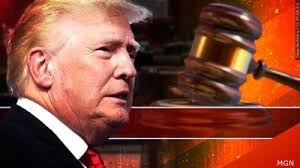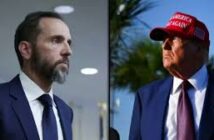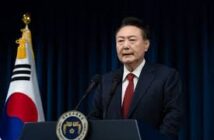
A Manhattan judge ruled on Friday, January 10, that Donald Trump would not face any penalties for his conviction related to the concealment of a “hush money” payment intended to keep a sex scandal from voters. This ruling makes Trump the first person convicted of a felony to assume the presidency.
Justice Juan Merchan, who presided over the trial where jurors were presented with evidence that Trump paid off adult film actress Stormy Daniels and Playboy Playmate Karen McDougal to silence them about alleged sexual encounters, sentenced Trump to an “unconditional discharge.”
“Sir, I wish you Godspeed as you assume a second term in office,” Merchan said during the sentencing.
The ruling means Trump, 78, will not face jail time, probation, or fines. Trump appeared remotely via video from Florida, positioned in front of two American flags, as the sentencing took place. With this decision, he will become the only U.S. president ever convicted of felony charges.
Manhattan District Attorney Alvin Bragg also marks a historic milestone as the first prosecutor to put a sitting or future president on trial.
Ahead of his sentencing, Trump decried the case as an “injustice” and reiterated his claims of a “witch hunt.”
“This is a case that should have never been brought, it’s an injustice, not justice,” Trump stated. “The fact is, I’m totally innocent, I did nothing wrong.”
He continued, criticizing the trial as “an embarrassment to New York.”
“I got indicted after calling a legal expense a legal expense. It’s an embarrassment to New York,” Trump added. “I was treated very unfairly, and I thank you very much.”
Prosecutor Joshua Steinglass, however, defended the verdict, calling it “unanimous and decisive” and emphasizing the importance of respecting it. He also condemned Trump for using “dangerous rhetoric” throughout the trial, referencing Trump’s threats aimed at the judge and prosecutors.
“Such threats are designed to have a chilling effect, to intimidate those with the responsibility to enforce our laws,” Steinglass said. “This defendant has caused enduring damage to public perception of the justice system and has put officers of the court in harm’s way.”
A key witness for the prosecution was Michael Cohen, Trump’s former lawyer, who was disbarred and convicted of perjury. Cohen testified about Trump’s involvement in arranging payments to silence Daniels and McDougal and to suppress damaging stories about him, including a secretly recorded conversation in which Trump appeared to authorize a $150,000 payment to McDougal.
The prosecution focused on evidence that Trump falsified company records in 2017 to conceal Cohen’s $130,000 payment to Daniels, who had alleged an affair with Trump in 2006. The payment occurred just before the 2016 presidential election.
Cohen admitted to repeatedly lying on Trump’s behalf and stealing $60,000 from him but testified that he had informed Trump in advance about the payment to Daniels because “I wanted the money back.”
While falsifying business records is typically a misdemeanor, doing so to cover up another crime escalates the offense to a felony.


